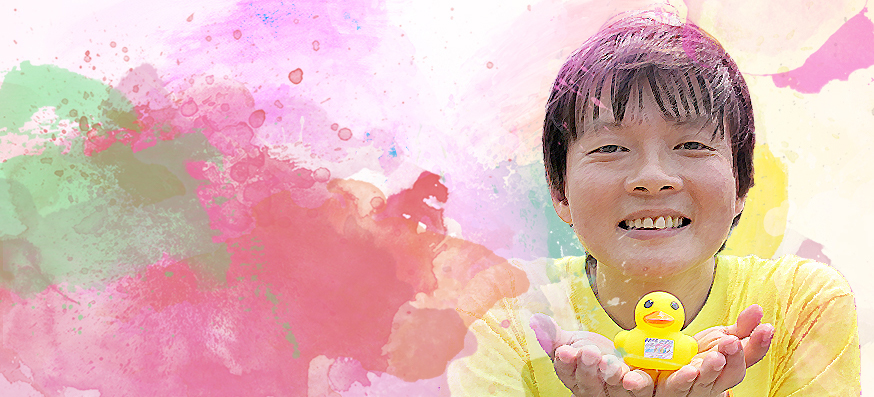Hiker Chiu only found out s/he is an intersex person at the age of 42. S/he was born with both male and female reproductive organs. S/he founded Organization Intersex International to promote knowledge and acceptance of intersex people in Taiwan. For this year’s Valentine’s Day, s/he hopes everyone can find their love.
When and how did you find out about your true gender identity?
I felt weird all the time, especially during my adolescence, when my biological changes were different from other girls. My mom only told me I was born with “two sets”. I was unware there was an intersex gender at that time. On my primary school diary, I wrote that I felt like a monster. I didn’t want to be a monster. My parents felt helpless. The doctor could do nothing to really help me.
I found out I was intersex at the age of 42, when I reread my medical case file about the operation I had when I was six, during which my “enlarged clitoris” was removed. I then Googled my condition, and gradually learnt that I was born a healthy baby, except that I had two sets of reproductive organs.

Does Taiwan society recognize the existence of intersex people?
Chinese societies more or less know the existence of intersex people but due to the traditional binary gender concept, there has been discrimination against people who are neither male nor female. As intersex people are seen to be unable to reproduce, and Chinese values focus a lot on continuing the family bloodline, many families think intersex people are useless. There is also religion and superstition, thinking an intersex baby is the result of the bad things the parents did.
When Western medicine came into practice in Taiwan in the 1950s, there was this concept of operating on intersex babies before they are two years old. This was meant to “help” the babies eliminate their “neither male nor female” condition so that they can integrate into society, and parents can also avoid “shame”. Intersex people have been almost “eliminated” from the society. Ever since I came out publicly around 2010, I haven’t received much news about other intersex people in Taiwan.
What can be done to improve the situation of intersex people in Taiwan?
We should be creative and not be trapped into the traditional mindset of marriage and having kids. Love has different ways. I’m optimistic about our environment in the future, as society develops a better understanding.
Hiker, founder of Organization Intersex International
It is really important to support our parents. My parents have felt sad, guilty and sorry towards me most of their lives. I had no idea why my body is a painful matter for my parents. My birth brought them so much pain.
Now I know intersex is a biologically natural variation. I hope parents understand that intersex babies are natural. Their intersex traits are not a disease and don’t need unnecessary treatment. Parents don’t need to feel sad about it.
There needs to be more education for the general public, letting them know that intersex people are common and not rare. They shouldn’t discriminate against us and see us as “shameful”. Why should we and our parents have to bear the consequence of society’s prejudice?
Doctors need to change their mindset too. Their intervention didn’t really help me. They need to rethink how to provide better care to intersex people. They need to respect our consent, our determination of our body, and stop treating intersexuality as a disease.
The government has yet to gain enough understanding of intersex people. They need to think about how to actively create a positive environment for us, and educate the public to accept us as valued members of society. In the past, people’s idea about gender has been quite narrow and restricted. Now they need to open their mind and recognize intersex people.
How has your activism changed the situation?
I’m changing Taiwan’s impression of intersex people and encouraging everyone to question if it is appropriate to operate on intersex babies without letting them have the choice. It also helps as Taiwan’s gender movement is now relatively mature, and the society has more tolerance towards gender diversity.
Love is all I’m trying to convey from my movement. Intersex people are also people, we love, we need love and we desire to be loved. It is the meaning of my Chinese name – love grass on a hill. My parents have been loving me wholeheartedly, and have helped me achieve what I have achieved today.
In Taiwan, do you think intersex people can love equally as others?
It is possible for intersex people to love, but if society still holds a negative opinion of us, it is difficult for us to start a relationship. For me, it is not that difficult as I don’t see myself as too different. But I have other friends who have this confusion as to whether the relationship shall be homosexual or heterosexual. We also face the pressure of reproduction.
What do you think of Valentine’s Day?
Valentine’s Day conveys the hope of love. I hope everyone can find their loved one.
After my coming out, many mainland Chinese friends have asked if I can find them partners from our community, as it is difficult for them to find an understanding partner. There is still heavy pressure in mainland China for people to get married and have kids. Ordinary people can’t really understand intersex people’s physical and mental feelings. We can’t fulfil ordinary people’s general expectations on relationships, marriage, reproduction and sexual behaviours.
We should be creative and not be trapped into the traditional mindset of marriage and having kids. Love has different ways. I’m optimistic about our environment in the future, as society develops a better understanding of this issue.


